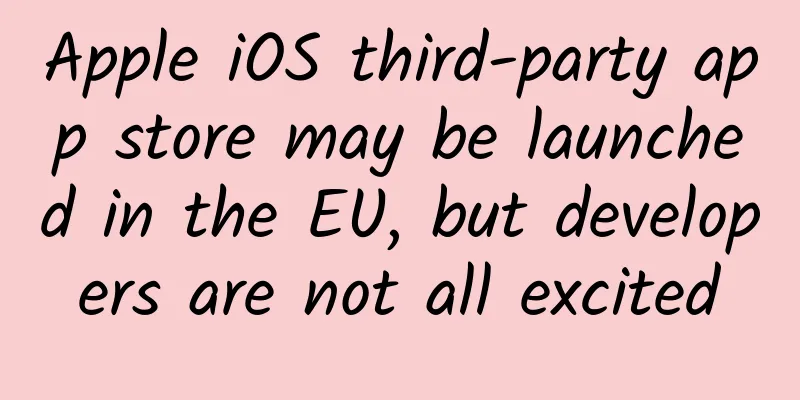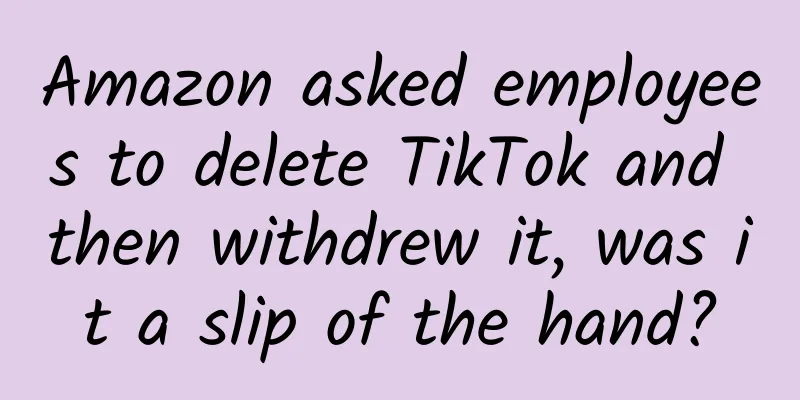Apple iOS third-party app store may be launched in the EU, but developers are not all excited

|
On January 3, Apple plans to introduce a third-party app store on its platform to meet the new EU Digital Markets Act regulations. AppleInsider, an Apple news website, asked several developers about their thoughts. Some were very excited about this, but many were also nervous. Although Apple is still strongly opposed to being forced to introduce a third-party app store, it is preparing for this change. It is believed that Apple's software and service engineers are preparing for the Digital Markets Act to take effect, which may require Apple to introduce a third-party app store by 2024. In general, developers seem to be at least accepting of the shift. In some cases, there is a lot of interest in what a third-party app store might bring. But among many developers who have been in the business longer, the attitude is more cautious. Excited about the future“We at Setapp are excited about the news that Apple is preparing to introduce a third-party app store on the iPhone, although this transition will initially only take place in the EU,” said Mykola Savin, chief product manager at Setapp. Setapp is a subscription service that started out as a Mac app store, but has been trying to include more iOS apps. Today, Setapp is a third-party app store. Savin continued: "Setapp is truly a third-party app store on the Mac, designed to benefit both users and developers. For users, Setapp offers a different way to consume and manage apps, with a fixed-fee subscription that gives access to a collection of frequently used apps." Savin said there are more than 240 Mac apps on Setapp, but only 37 iOS apps, all of which are iOS versions of cross-platform Mac apps. "We are currently restricted by Apple and cannot add iOS-only apps to the platform," he said. "We are happy to serve as an alternative to Apple's App Store because that is what our users and iOS developers who apply to join Setapp want." Just as Setapp saw advantages in separating Mac and iOS apps, the developers behind Luna Display saw an opportunity to combine hardware and software. Luna Display lets Mac, iPad, and PC users share each device's screen with other devices. "I would like to see iPad and iPhone open to third-party app stores! I firmly believe that competition creates more choices for consumers. And the current situation is that Apple's App Store has no competitors," said Matt Rouge, founder of Luna Display. He explained: "Right now, if you sell a hardware product that is compatible with an app, you need to release the app through the Apple App Store. This is inconvenient because without the hardware, the apps won't work at all! For our service, for example, we had to build a special 'virtual' hardware mode to get the app through Apple's app review. So why do we have to release the app through the Apple App Store? Wouldn't it be better if we could just download it from our website!" Ruger said it would also allow companies like Luna Display to keep older versions of their apps, which is "not possible" through the Apple App Store. In addition to his own company, Ruger believes that having an app store that takes a much lower commission than Apple's 30% could spur more innovation. "What new apps might emerge? What happens if there are beta apps or experimental features that are not allowed in the App Store? Can we experiment and innovate faster? Can we launch new experimental features faster?" Ruger asked. Apple's current App Store is pretty goodOf course, not everyone is excited about the arrival of third-party app stores. Developer groups like Omni Group remember the high costs involved in selling CD-ROM software through retail stores, and they ultimately don't expect much change in the Apple ecosystem. “It’s hard to say what the overall impact of the Digital Markets Act will be, but I don’t expect it to have much of an impact on our specific software releases,” said Greg Titus, chief technology officer at Omni Group. “Omni’s productivity apps fit right in with the purpose of the Apple App Store, and overall we’re very happy with the support Apple has given us and the way our apps are sold through its App Store.” James Thomson, the developer of the full-featured scientific calculator PCalc, further predicted that users will continue to use Apple's App Store. He said: "Personally, I don't think it makes much sense for us to introduce a third-party app store. When we sell PCalc directly in the Mac App Store and on our website, we see that more than 80% of people choose to buy through the Apple App Store." “Despite all the extra paperwork involved, it doesn’t make a lot of sense to sell through other app stores, and I really don’t see much point in doing so in the future,” Thomson continued. “Of course, we won’t do anything that might conflict with app review, and there will be different considerations for different types of apps, but I don’t think we would turn to other app stores even if they were available.” A threat to Apple's business?Third-party app stores will benefit some companies and may not have much impact on others. But the question is, will it affect customers or Apple? “I don’t think third-party app stores are a threat to Apple’s business, either from a revenue or security perspective,” said Setapp’s Savin. “If you look at Android, sideloading hasn’t had a big impact on Google Play. And Macs have long allowed sideloading of apps.” He continued: "We know from Setapp's recent Mac App Report that for most Mac users, the Apple App Store remains the most popular and trusted way to find and get the latest apps. I think the situation is similar for iOS users, and the introduction of a third-party app store won't change much." Thompson, whose PCalc has been on the market for more than 30 years and is available in Apple's App Store on everything from iOS to Apple TV 4K, is more concerned about the threat to developers. "My main concern is that if Apple does open up sideloading in a broader way, it will lead to a proliferation of pirated apps on iOS, just like we see on the Mac today," he said. So, some developers are excited about Apple's introduction of a third-party app store, while others are cautious, but everyone agrees that it's still early days for this transition. “I have more questions to be answered about how the Digital Markets Act might affect Apple’s platforms,” said Omni CEO Ken Case. “It could make the app distribution process on iOS more like MacOS, but how similar remains to be seen.” |
<<: Brief Analysis of Application Debugging Principles
>>: Performance test of MQTT maximum number of device connections
Recommend
The principle that Archimedes discovered while taking a bath: buoyancy is equal to the weight of the displaced water. How do you understand it?
This article is based on answering questions from...
Chinese oryx on the shore of Qinghai Lake
Chinese oryx on the shore of Qinghai Lake Zhao Ji...
The tip of the iceberg of "infrastructure maniac" - Xiangli Expressway
As a person who grew up in the countryside, from ...
Shenyang Mini Program Production Company, how much does it cost to produce an educational mini program?
How much is the quote for educational production ...
11 low-key but useful details in Android 9.0 Pie
Android 9.0 Pie was officially released a few day...
Tree rings are the most commonly remembered traces of time
Humans are the longest-lived mammals, but we stil...
How much does it cost for a WeChat mini program development company to develop a WeChat mini program?
For many small and medium-sized enterprises, espe...
Alternative fun: 10 programming language features that confuse programmers
Every language has its own unique features, wheth...
Broken promise or innovation? AutoNavi opens LBS technology to support O2O business
In the early days when Yu Yongfu officially took ...
Baidu Information Flow 11.11 Marketing Manual!
How is the traffic trend of Baidu Information Flo...
The more you walk, the lower your risk of death?
Insufficient physical activity affects more than ...
How to crack the growth code of products?
How to understand growth? I believe that the core...
Dongchedi: Analysis report on car users' purchasing behavior in November 2019
On January 2, the China Automobile Dealers Associ...
What is the refraction of light? Why does light bend downward when it enters water, while chopsticks in water bend upward?
Many people have this question. The explanation i...
How does double-click wake-up work on smartphones?
There are many ways to wake up the screen, and th...









